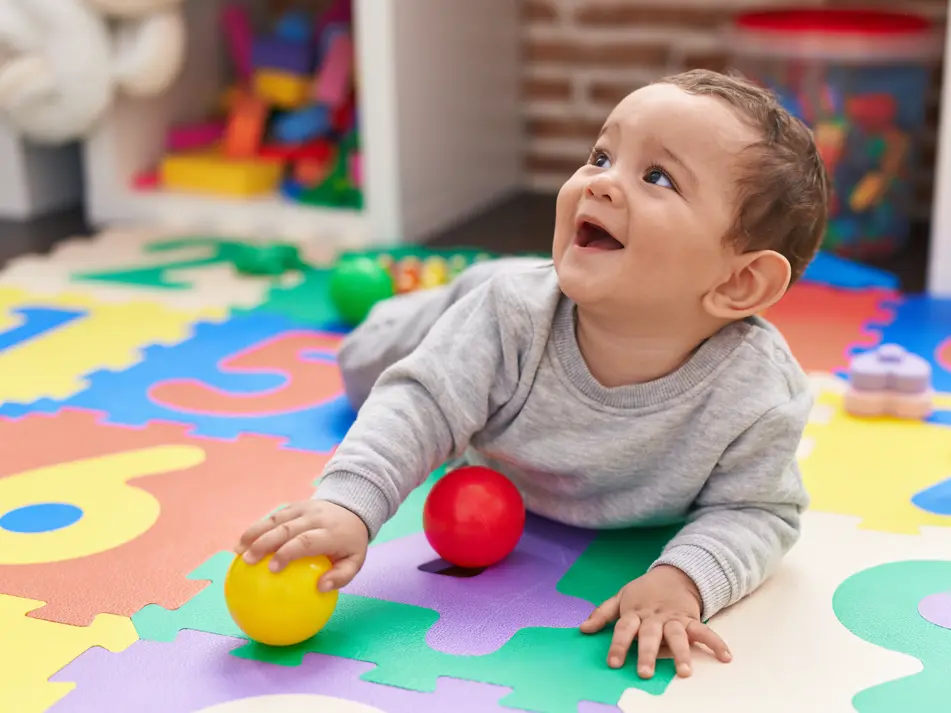Baby Routines

On this page
The following routines are a guide only as your baby’s needs and tired cues (signs) for sleep may vary.
Baby & Newborn Routines
Baby Routines over the years have gained a lot of bad press. Routines are frequently discussed as rigidly adhering to a timetable of activities. For many parents having their baby in a routine has been a lifesaver. Importantly, babies seem to respond well to having a routine, especially if the routine is mostly baby-led or follows your baby’s emerging daily pattern and developmental needs. A routine provides reassurance that all is well in your baby’s world. They know that when they get up in the morning there will be food, they can have a play and then it’s time for another sleep or a bath and so on. Their world becomes a predictable place as there is a pattern to their day.
Routines that work usually have some degree of flexibility to allow for the intrusion of daily life. They are not rigid, but rather provide a predictable flow to the day. Having a routine also helps parents start to read their baby’s cues as they can easily link them with what comes next in the routine. Unfortunately, sometimes the routine needs to be broken. There are common events that can cause routines to be disrupted.
The first is when happy events occur, like family visits, parties, and other social events or holidays. These events can challenge the maintenance of a routine. Rather than not participate, reassure yourself that when you get home you will start the routine again.
The second circumstance is when a parent returns to the paid workforce. There are lots of new activities to get used to for both baby and parent. Having a routine is very important for babies and their parents in the paid workforce.
The third circumstance is when your baby reaches a new developmental stage, e.g. they want to practise a new skill like rolling or standing. They become more alert and aware of their world, and sleep and awake periods become longer.
The final circumstance where routines can be disrupted is if you or your baby become unwell. Once again, rather than trying to maintain a routine, it is better to go into survival mode until you or your baby are well again.
Many babies, if they have a general pattern or flow to their day, will easily return to the routine after short disruptions. It may take up to a week, but the important thing is that you try to remain consistent with your baby.
Baby play and sleep routine
Your baby is strongly influenced by the environment, baby daily activities and routines. A predictable routine (sequence of activities) including a wind down period (for example, meal, bath, cleaning teeth, story time, cuddle and kiss, and into the cot/bed) helps your child establish good sleep patterns.
The feed, sleep, play routine (for younger babies) or feed, play, sleep, play routine (for older babies) is the core structure of a baby’s day.
As your baby matures, daytime play increases and night patterns continue but without playtime. Your baby is unique, therefore their need for sleep and the time of waking varies. Some days things will go smoothly, but illness, disruption to the family environment and/or extra busy days can all affect your baby’s routine. It takes time for your baby to develop a predictable routine. Being consistent and patient are the key characteristics that babies need to help form and maintain a routine.
The following routines are a guide only as your baby’s needs and tired cues (signs) for sleep may vary from the examples below.
Daily routine - newborn to 3 months old
The first three months is when newborn daily routines start to be formed. The early weeks are usually a little chaotic as parents learn about their baby’s likes and dislikes. This is a time when some babies are usually the most unsettled, often crying for what seems like very long periods of time. Babies can require two to three night-time feeds. The period between 4 to 6 pm can be when they are extremely unsettled, crying for extended periods of time. Some parents feel as if they are on a treadmill of feeding, trying to settle their baby, having a baby who sleeps for very short periods and then wakes crying ready for their next feed. Believe it or not, this is the start of a routine developing and it will become easier as awake and sleep times consolidate and become longer.
REMEMBER: IT TAKES TIME FOR YOUR BABY TO DEVELOP A PREDICTABLE PATTERN. THIS CAN BE A FUN TIME AS YOUR BABY DEVELOPS NEW SKILLS SUCH AS EXPLORING THEIR WORLD.
Daily routine - 3 months old to 6 months old
Babies become more predictable in their routine by three to six months. It is not until three to six months that most babies are capable of sleeping for longer periods through the night (approximately six hours). They generally settle well overnight but many babies may still need one to three milk feeds. Awake time is becoming longer. Time spent playing with and talking to your baby is very important for their development. Some ideas for interacting during awake/play time include:
- Tummy time (floor play)
- Using rattles and soft toys
- Taking baby for a walk in the pram
- Telling stories using soft books, learning to turn the pages
- Having a relaxing bath time or baby massage
- Singing songs or playing music
- Visiting friends
- Having lots of conversations with your baby.
Sleep times can vary, with some babies having three longer sleeps per day and others needing only short naps. If your baby is generally alert and happy, your baby is probably getting enough sleep. Remember to help your baby transition from play to sleep and have a period of activities that are calming, e.g. calm and soft talking, music or singing, and cuddles.
When your baby is awake try to interact with them. Babies love:
- Supervised tummy time (floor play)
- Playing music and singing songs
- Reading stories or singing nursery rhymes
- Playing finger or toe games
- Providing toys that move, make sounds, are colourful and vary in texture
- Giving lots of cuddles
- Visiting friends/your local park/join a playgroup.
NOTE: As your baby gets older they will progress to only one sleep per day – watch your baby to see when they give you cues (signs) they are tired. the morning sleep will progressively get later in the day until it becomes a middle of the day or early afternoon sleep. your baby is now more mobile so it is very important to ensure your home environment is a safe environment. now is the time to install childproof locks and other home safety devices.
Daily routine - 6 months old to 12 months old
By 6–8 months your baby’s routine is starting to change. This is often a time when your baby is more active during the day. By eight months many babies only need two daytime sleeps, while other babies still need three sleeps per day. Base your routine on your baby’s cues/needs for sleep. If your baby is generally alert and happy your baby is probably getting enough sleep. They may be less hungry when they wake and enjoy a short period of play before being fed.
The time they reach their 6 month old routine, your baby can start solids. It is also a good time to begin feeding your baby cooled boiled water from a cup. Some ideas for interacting during your baby’s awake time include:
- Floor play
- Music/singing
- Story time/nursery rhymes
- Finger/toe games
- Toys that move, make sound, colourful and vary in texture
- Cuddles
- Baby massage
- Water play, especially at bath time.
By eight months your baby may have moved to just two daytime sleeps. If your baby wakes early or you need your baby to go to bed later, an additional sleep period may be needed. At this age babies may still be night waking or even start to night wake – this can be related to separation anxiety (a developmental stage for this age). Babies at this age also like to practise new skills such as pulling to stand, crawling and talking. If this happens provide your baby with reassurance and try to resettle with minimal fuss.
Some ideas for interacting during playtime include:
- Playing music, singing and dancing
- Providing moving toys/dolls/teddies
- Reading stories and using cloth books
- Singing nursery rhymes
- Playing stacking games
- Playing with toys that move, make sound, colourful and vary in texture
- Playing with posting games – putting colourful shapes into a container with a special lid that has a matching shape hole
- Using pulling and pushing toys
- Visiting friends, local parks and play groups.
NOTE: As your baby gets older they will progress to only one sleep per day – watch your baby to see when they give you cues (signs) they are tired. the morning sleep will progressively get later in the day until it becomes a middle of the day or early afternoon sleep. your baby is now more mobile so it is very important to ensure your home environment is a safe environment. now is the time to install childproof locks and other home safety devices.








































